Darwin College, Cambridge
| Colleges of the University of Cambridge | ||||||||||||||||
| Darwin College | ||||||||||||||||
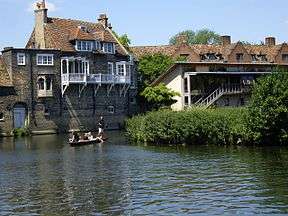 | ||||||||||||||||
|
| ||||||||||||||||
| Founders | Gonville & Caius College, St John's College and Trinity College | |||||||||||||||
| Named after | The Darwin Family | |||||||||||||||
| Established | 1964 | |||||||||||||||
| Master | Mary Fowler | |||||||||||||||
| Undergraduates | None | |||||||||||||||
| Graduates | 674 [1] | |||||||||||||||
| Sister college | Wolfson College, Oxford | |||||||||||||||
| Location | Silver Street (map) 52°12′2″N 0°06′49″E / 52.20056°N 0.11361°ECoordinates: 52°12′2″N 0°06′49″E / 52.20056°N 0.11361°E | |||||||||||||||
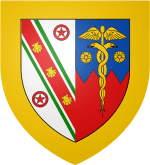 | ||||||||||||||||
| College website | ||||||||||||||||
| Student Association website | ||||||||||||||||
| Boat Club website | ||||||||||||||||
Darwin College is a constituent college of the University of Cambridge. Founded on 28 July 1964, Darwin was Cambridge University's first graduate-only college, and also the first to admit both men and women. The college is named after one of the university's most famous families, that of Charles Darwin. The Darwin family previously owned some of the land, Newnham Grange, on which the college now stands.
The college has between 600 and 700 students, mostly studying for PhD or MPhil degrees. About half the students come from outside the United Kingdom, representing 80 nationalities as of 2016. Darwin is the largest graduate college of Cambridge.
History
A significant increase in the number of postgraduate students at Cambridge University in the post-war period led to a growing realisation that a graduate college was becoming a necessity. In 1963, three of the university's older colleges – Trinity College, St John's College, and Gonville and Caius College – announced their intention to jointly form a new, wholly graduate college. The college was established in 1964, located on the bank of the River Cam, opposite Queens' College. On 29 January 1965, the Privy Council gave formal approval to the college as an Approved Foundation. It received its Royal Charter as an independent college within the university in 1976.
The college is named after the Darwin family, Charles Darwin's second son, George Darwin, having owned some of the property which the college now occupies. He bought Newnham Grange, the oldest part of the college, in 1885, together with the adjacent building known as the Old Granary, and Small Island. (Newnham Grange was originally built in 1793 for the family of Patrick Beales, a local corn and coal merchant. It was extensively remodelled by George Darwin.) Following the death of George's son, Sir Charles Galton Darwin, in 1962, those concerned with the foundation of the new college learned that the property was to become available. Katherine, Lady Darwin, and her family were very receptive to the idea of their home becoming the nucleus of a new college, and to the suggestion that it should bear the family's name. Family portraits of the Darwin family are on loan to the college from the Darwin Heirloom Trust and can be found on the walls of several of the college's main rooms. In the book Period Piece: A Cambridge Childhood, the granddaughter of Charles Darwin, Gwen Raverat describes how she grew up at Newnham Grange.
In 1966, the college also acquired the Hermitage (a house built in the nineteenth century on the west side of Newnham Grange) from St John's College. Work to convert and extend the college's buildings was funded by the founding colleges and through substantial donations from the Rayne Foundation.
In 1994, Darwin College completed construction of a new library and study centre along the side of the Granary. The centre is built on a narrow strip of land alongside the millpond in Cambridge, and uses a structure of green oak and lime mortar brickwork. The building uses high-level automatically opening windows and a chimney to control natural ventilation. The building has also been designed with special connections which could be tightened to account for the shrinkage.
In 2010, the College acquired No 4 Newnham Terrace, the former Rectory for the Church of St Mary the Less, Cambridge (Little St Mary's) thereby finally establishing an entire boundary for the College from Queen's Bridge to Newnham Road and thence to The Granta. The long boundary returns to Queen's Bridge and is formed by the two islands in the middle of the river.
As of 2016, Darwin remains to be by far the most popular graduate college, ranking fourth among all Cambridge colleges in graduate students' first and second choices.
Student life
The college organizes the annual Darwin Lecture Series, eight talks over eight weeks structured around a single theme (such as 'Power') examined from very different perspectives (scientific, humanities, arts), given by eminent speakers who are leading international authorities in their fields. The lectures have been hosted for over twenty-five years and form one of the key events in the Cambridge calendar. Most of the series of lectures have been published as books.
In sports, Darwin College Boat Club is a popular student society at Darwin College, as well as Darwin College Football Club who play in the long established Cambridge University Association Football League (CUAFL), representing the only graduate college within CUAFL. The club plays throughout the year in and out of term.
Every Darwinian is automatically a member of the Darwin College Student Association (DCSA). The DCSA committee comprises 20 students, organizing events and parties, supporting societies, and helping students make the most of their time in Cambridge.[2]
Notable alumni
Elizabeth Blackburn, the 2009 Nobel laureate in medicine, studied for her PhD at Darwin. Dian Fossey, Brian Gibson (director) and Sir Ian Wilmut are alumni/ae. Paul Clement, the former United States Solicitor General, read for an MPhil in Politics and Economics at Darwin in 1988-89. In recent years, the Canadian TV host Seamus O'Regan studied at the college.
The philosopher Huw Price, current Bertrand Russell Professor of Philosophy at Cambridge, studied for his PhD in philosophy at Darwin under the philosopher Hugh Mellor, an erstwhile fellow of the college. The philosopher Nigel Warburton also studied his PhD at Darwin.
Three current masters of Cambridge colleges are Darwin alumnae: Professor Mary Fowler (Darwin), Mrs Nicola Padfield (Fitzwilliam), and Professor Dame Jean Thomas (St. Catharine's).
- Elizabeth Blackburn: 2009 Nobel laureate in medicine
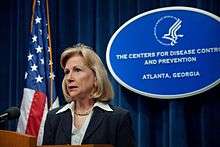 Nancy Cox: Virologist
Nancy Cox: Virologist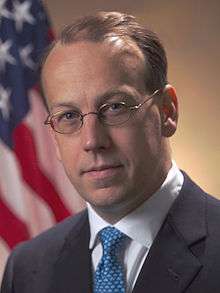 Paul Clement: Former United States Solicitor General
Paul Clement: Former United States Solicitor General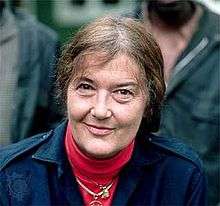 Dian Fossey: American zoologist
Dian Fossey: American zoologist Seamus O'Regan: Canadian politician and journalist
Seamus O'Regan: Canadian politician and journalist
Notable Fellows
César Milstein, who received the 1984 Nobel Prize in Physiology or Medicine, was a Fellow of Darwin College from 1980 to 2002. Sir Karl Popper and the Nobel Prize winner Max Perutz were Honorary Fellows, as are Amartya Sen and Martin Rees (The Lord Rees of Ludlow). Oliver Letwin was a research Fellow from 1981 to 1982.
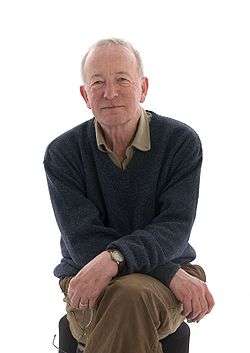 Nicholas Humphrey: Psychologist
Nicholas Humphrey: Psychologist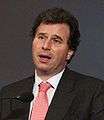 Oliver Letwin: Politician
Oliver Letwin: Politician Simon Schaffer: Historian
Simon Schaffer: Historian Amartya Sen: 1998 Nobel laureate in economics
Amartya Sen: 1998 Nobel laureate in economics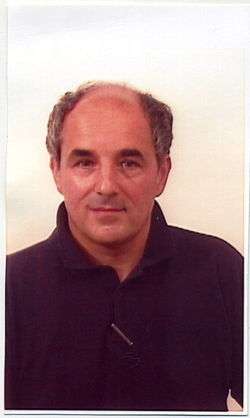 Gabriel Herman: Historian
Gabriel Herman: Historian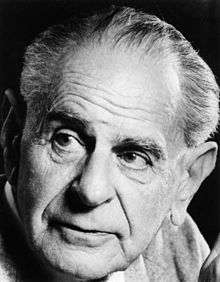 Sir Karl Popper: Philosopher of Science
Sir Karl Popper: Philosopher of Science Max Perutz: 1962 Nobel laureate in chemistry
Max Perutz: 1962 Nobel laureate in chemistry Martin Rees: Astrophysicist
Martin Rees: Astrophysicist César Milstein: 1984 Nobel laureate in medicine
César Milstein: 1984 Nobel laureate in medicine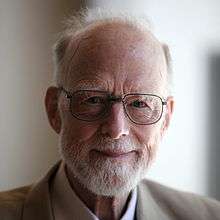 Tony Hoare: Computer scientist
Tony Hoare: Computer scientist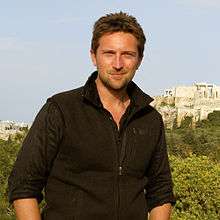 Michael Scott (author): Moses and Mary Finley Research Fellow
Michael Scott (author): Moses and Mary Finley Research Fellow
Gallery
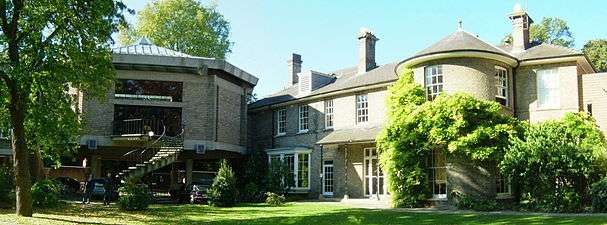 Main Building
Main Building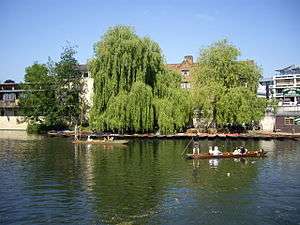
 Darwin College Library from the millpond
Darwin College Library from the millpond- Inside the grounds of Darwin College
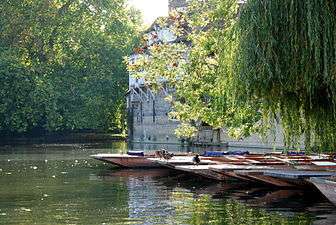
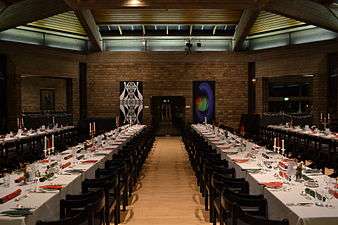 Darwin College Dining Hall, Christmas 2011
Darwin College Dining Hall, Christmas 2011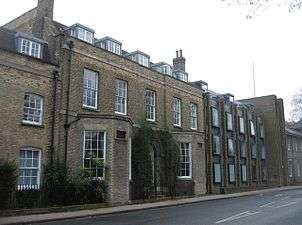 Silver Street
Silver Street Newnham Grange
Newnham Grange
See also
- Malting House School
- Masters of Darwin College, Cambridge
- Colleges of the University of Cambridge
References
- ↑
- ↑ http://dcsa.dar.cam.ac.uk/drupal6/info/student-life/student-association-dcsa/your-representatives
External links
| Wikimedia Commons has media related to Darwin College, Cambridge. |
